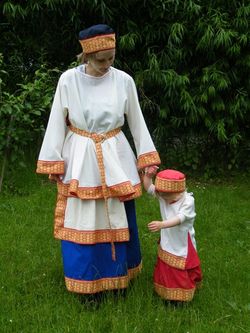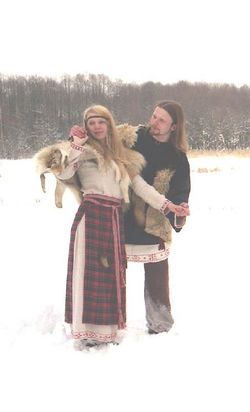Varushka culture and customs
Family
A respect for family is central to Varushkan culture. Varushkans commonly use familial titles to show respect and friendship. Friends may call each other Cousin, or even Brother or Sister if they are particularly close. Calling someone Uncle or Aunt indicates a significant degree of respect and acknowledges someone’s seniority and authority while Grandfather or Grandmother is usually used for the oldest and most respected members of the community. Individuals honoured in this way are usually treated just like any other family member.
Old age commands respect in Varushka. Older relatives who pass their wisdom and experience down to the younger generations are treasured. To the Varushkans, long years both grant, and demonstrate, wisdom. Fools die young, and their strength does not save them. Varushkan folklore includes countless stories where the young hero gets into trouble after ignoring the advice of their elders.
Often this tradition of the older generation passing their wisdom to the younger is demonstrated in the form of an apprenticeship. Rarely formalised, it is especially common with magicians and priests. An older individual takes a younger one "under their wing" and imparts their wisdom while engaging in day-to-day activities. The younger individual for their part helps the older individual in any number of ways, often serving as an assistant or conversational foil, for example.
Parting
Varushkans have a tradition of gift giving before and after a significant journey. When a Varushkan leaves their family for the first time, there is usually a ceremony to mark the occasion, a celebration that culminates with one or more gifts. Travellers sometimes do not come back, or come back changed, so when family return from such travels, there is a second celebration where the returning traveller is expected to give gifts in their turn. Traditionally the gifts given to a departing family member are usually practical, while gifts given by the returning family member are usually decorative mementos of the traveller's journey.
The Varushkan people cannot afford to suffer the foolish or indulge the lazy for long. The slothful, the ignorant, the arrogant and the petty criminal – anyone whose presence is no longer tolerable – receives an unlooked for parting ceremony, receiving the traditional departure gifts of a travelling cloak, a sack, a meal of bread and cheese, and a stout staff before effectively being exiled. Such individuals either learn harsh lessons in self-sufficiency or die in the wilderness between vales. The luckiest fall in with a group of travelling Navarr, while others end up joining a new community, become bandits or leave Varushka forever. While some hold grudges against the vales that threw them out, those who learn from their experiences and become better people feature strongly in Varushkan folklore.
One particular parting tradition is performed on the eve or the morning of battle, or before an especially long or perilous mission. Most often a spouse or lover, but sometimes a close friend or parent, spends time braiding the hair of the loved-one who is leaving into an intricate weave, working charms of protection in as they go. The hair is not untied until they are together again. Those without long hair are often ceremonially presented with a hank of braided animal hair, or knotted yarn, which will be carried until the pair are reunited and untie it together. In much of Varushka this is also performed for the beloved dead as they set off on their last journey - some folk-takes refer to the shame of going from this life with loose hair and thus unloved.
Hospitality
Anyone who lives in Varushka for long learns to be naturally suspicious of strangers. The land has many dangers and some can take a pleasing form if they choose to. Despite this they traditionally offer a warm welcome to any who stay after nightfall. Varushkans rarely let their guard down around strangers, but they know that treating them well is the best way to ensure prosperity and avert danger.
Treating a stranger well is the first step to turning them into an ally, and encourages them to respond in kind – pitching in with the cleaning, the cooking and so on. More importantly, treating a disguised monster well traps them in the role of well-behaved guest. As long as they are not mistreated, the rules of hospitality mean they cannot harm anyone. There are several cautionary tales of Varushkans who forget the importance of these customs and bring terrible suffering down on themselves and their families.
Bringing your own food and drink and sharing it with your hosts is a cultural expectation as well as common courtesy. Visitors who break the traditions of hospitality by being rude or taking their hosts for granted may be offered a drink or a meal “for the road”. This phrase is a pointed warning that your behaviour is offending your hosts and the visitor who does not mend their ways faces immediate ejection. Depending on the circumstances a wise visitor might decline the offer and ask instead for a bed for the night. A foolish visitor who accepts the offer or carries on causing offence faces expulsion into the dark night.
Celebration
Day is the time for hard work. Celebrating before the sun touches the treetops implies indolence and invites the land to punish you accordingly. Few celebrations are ever held during daylight and as a result many Varushkans appear dour and parsimonious at first. In fact, they reserve their merrymaking for nightfall when feasts, drinking, dancing, toasting, storytelling and singing abound. Varushkans love dark bread and honey, and many meals start or end with it. Honey is also used to brew mead or create sweets, and bees are a powerful symbol of Prosperity, wealth and the family.

